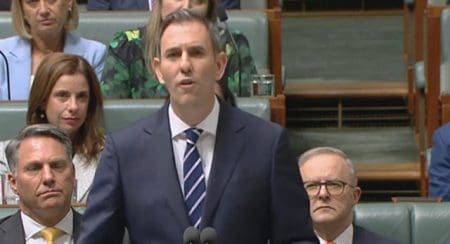
Treasurer Jim Chalmers delivers the Federal Budget in the House of Representatives last night.
BIOSECURITY and worker and market access for Australia’s agricultural sector will be boosted by $1.5 million of new spending in the Federal Budget tabled in parliament last night, but farmers, travellers and importers will pay more to underpin Australia’s first ongoing sustainable biosecurity funding model.
The model was sketched out by Minister of Agriculture Murray Watt in a media statement last night.
A proposed increase in agricultural levies, “set at a rate equivalent to 10 percent of the 2020-21 industry-led agricultural levies” from July 2024 is expected to raise $153M over three years.
This was criticised by National Party leader and Shadow Minister for Agriculture David Littleproud as amounting to a food tax on Australian families.
Under the proposed biosecurity funding model, the government expects larger importers to contribute $350M to biosecurity costs next year via an increase in fees and cost-recovery charges.
Import items valued at $1000 or less will attract a new biosecurity levy, aiming to raise $81M over three years.
Mr Watt said the model will result in more than $1 billion of additional funding for biosecurity, including $845M to support biosecurity operations across the country, protecting the nation’s valuable agricultural industries.

Federal Minister for Agriculture Murray Watt said the model will result in more than $1 billion in biosecurity funding.
“For the first time, an Australian Government is locking in higher, ongoing and more predictable biosecurity funding, from year to year, drawing a line under years of stop gap, temporary funding from Coalition governments, that placed our agriculture sector at risk.”
Mr Watt said to address risks from travellers and parcels, funding from an increase to the Passenger Movement Charge will contribute to the cost of biosecurity, and cost recovery will be expanded to include the biosecurity clearance of parcels and non-letter mail.
The charge will increase by $10 from mid-next year and apply to all passengers departing the country.
“Importers will contribute more fairly through their clearance costs with increased fees and charges expected to take their total contribution to biosecurity costs to almost $350M next year,” Mr Watt said.
“The Albanese Government will also explore options to introduce a broader biosecurity import levy that is consistent with international trade law obligations.
“We will also introduce a modest new biosecurity protection levy on agriculture, fisheries and forestry producers, creating a new system that will be more predictable, equitable, transparent and accountable than ever before.
“We are locking in higher and more certain biosecurity funding, along with a fair system to pay for it that shares the cost equitably between taxpayers, importers, parcel senders, international travellers and producers.”
Key agriculture measures in the 2023 Federal Budget include:
- $145.2M upgrade to digital biosecurity services through a Simplified Targeting and Enhanced Processing System. This aims to modernise cargo-management systems, reducing costs and delays for industry and government. This will free up biosecurity workers for other jobs and reduce congestion at the border;
- $40.6M to continue the Indigenous Ranger Biosecurity Program in Northern Australia, a key part of frontline biosecurity monitoring, detection and response;
- $302.1M over five years to support climate-smart agriculture through the Natural Heritage Trust, helping farmers transition to a low-emissions future and strengthen agricultural sustainability.
- $38.3M for ABARES to improve the collection, analysis and sharing of data on the impact of climate change and low-emission technology on agriculture, to assist policy making and farmers’ decision making;
- $127M to the Department of Agriculture, Fisheries and Forestry, a one-off payment in 2022-23 to ensure its viability;
- $5M to develop a renewed Australian Animal Welfare Strategy to deliver on the government’s election commitment to update and enhance a national approach to animal welfare.
Mixed response from GrainGrowers
GrainGrowers chief executive officer Shona Gawel said Australian growers deserved more investment in areas including biosecurity, infrastructure and taxation than Budget 2023 delivered.
Ms Gawel said the decision to impose a biosecurity protection levy on producers was disappointing, as farmers were not risk creators and could now be facing undue costs.
“Murray Watt only recently endorsed an independent report by the Invasive Species Council that suggested the people who create the biosecurity risks need to pay their fair share,” Ms Gawel said.
“The imposition of what the government believes is a ‘modest levy’ is neither fair or well directed and we would respectfully ask the government to reconsider such a short-sighted decision.”

GrainGrowers CEO Shona Gawel.
Ms Gawel said while some money had been allocated to road funding, the amount was disappointing as recent flooding and high rainfall have done unprecedented damage to rural roads across the nation.
“While we understand the financial constraints facing the government, decimated rural roads are driving up inflation and putting regional drivers at risk.
“With climate change increasing, we need urgent investment to ensure the resilience of road network.
“Rural roads must not be left behind in Australia’s $120B infrastructure investment pipeline”.
Amid the COVID-19 pandemic, the former Federal Government in 2020 lifted the threshold for instant asset write-off to $150,000 per asset from $30,000.
The threshold was then lifted altogether, and extended into the current and previous financial year.
As of July 1, it will be capped at $20,000 in a move that has been expected, and is expected to take away a sweetener from machinery sales.
“In the feedback we’ve received from growers, they have been looking to government to provide a solid incentive to invest in the machinery required to gain efficiencies and improve productivity.
“Given the persistent delays and global shortages in accessing machinery, an extension would have enabled farmers to receive the current machinery and assets on order.”
Ms Gawel said additional funding for childcare was a welcome step forward in the budget.
“This funding addresses a range of issues affecting growers concerning childcare access.
“While it may not appear to be an obvious issue for the grains industry, preparation is well underway for a Rural and Regional Childcare Roundtable to work through the issues and consider the next steps.”
NSW Farmers criticises farmer levy
President of NSW Farmers Xavier Martin said the budget has “fallen short” of expectations, particularly around the significant biosecurity threats Australian farmers face.
“At first glance, $1B in extra funding to strengthen biosecurity measures sounds great; however, it’s farmers that are being told to pay for it with a new biosecurity protection levy,” Mr Martin said.
“Biosecurity is a significant threat on many levels, not just for agriculture, but for the Australian economy in general.
“It’s risk creators, the people exposing our country to deadly diseases and pests, that should be bearing the brunt of the cost, not farmers who are growing our food and fibre.
“Sure, importers will be paying slightly more but quite frankly, it’s not enough.”
NSW Farmers has welcomed some budget announcements, including deductions of an additional 20pc of the cost of depreciating assets that support more efficient use of energy, and support for apprentices.
“On the upside, the budget has allowed for moves to improve apprenticeship support services and drive-up apprenticeship completion rates.
“Worker shortages is a real problem across our sector, so it’s a step in the right direction.”
Tax will hit families: Littleproud
Mr Littleproud responded to the budget last night, and said it will introduce a new food tax on Australian families in the middle of a cost-of-living crisis.
He said the tax on farmers to pay for the biosecurity risk of international importers was senseless and would be passed on to consumers, which meant even higher grocery bills for all Australians.
“It is unfathomable the Labor Government would ask farmers to pay for the biosecurity costs of importers from other countries,” Mr Littleproud said.
Source: Sheep Central, GrainGrowers, NSW Farmers



HAVE YOUR SAY